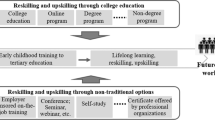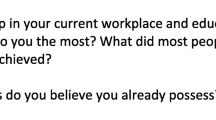Abstract
There is an emerging trend within healthcare to introduce competency-based approaches in the training, assessment, and development of the workforce. The trend is evident in various disciplines and specialty areas within the field of behavioral health. This article is designed to inform those eorts by presenting a step-by-step process for developing a competency model. An introductory overview of competencies, competency models, and the legal implications of competency development is followed by a description of the seven steps involved in creating a competency model for a specific function, role, or position. This modeling process is drawn from advanced work on competencies in business and industry.
Similar content being viewed by others
References
R.D. Coursey L. Curtis D.T. Marsh J. Campbell C. Harding L. Spaniol et al. (2000) ArticleTitleCompetencies for direct service staff members who work with adults with severe mental illnesses in outpatient public mental health/managed care systems Psychiatric Rehabilitation Journal 23 IssueID4 370–377
Equal Employment Opportunity Commission, Civil Service Commission, Department of Labor, & Department of Justice. (1978). Uniform guidelines on employee selection procedures. Federal Register, 43(166), 38295–38309
InstitutionalAuthorNameEqual Employment Opportunity Commission (1991) ArticleTitleEqual employment opportunities for individuals with disabilities: Final rule Federal Register 56 IssueID144 35726–35753
T. Gilbert (1996) Human competence: Engineering worthy performance International Society for Performance Improvement Washington, DC
Hoge, M.A., Tondora, J., & Marrelli, A.F. (in press). The fundamentals of workforce competency: Implications for behavioral health. Administration and Policy in Mental Health.
InstitutionalAuthorNameInstitute of Medicine (2000) To err is human: Building a safer health system National Academy Press Washington, DC
InstitutionalAuthorNameInstitute of Medicine (2001) Crossing the quality chasm: A new health system for the 21st Century National Academies Press Washington, DC
InstitutionalAuthorNameInstitute of Medicine (2003) Health professions education: A bridge to quality The National Academies Press Washington, DC
R. Kelley J. Caplan (1993) ArticleTitleHow bell labs creates star performers Harvard Business Review 71 IssueID4 128–139 Occurrence Handle10127037
D. Langdon (2000) Aligning performance: Improving people, systems and organizations Jossey-Bass/Pfeiffer San Francisco
D. Langdon A.F. Marrelli (2002) A performance-based model for competency identification: The workshop Performance International Bellingham, WA
A. Lucia R. Lepsinger (1999) The art and science of competency models: Pinpointing critical success factors in organizations Jossey-Bass/Pfeiffer San Francisco
A.F. Marrelli (1994) ArticleTitleThe Americans with disabilities act and selection Human Resources Bulletin 1 IssueID2 1–4
A.F. Marrelli (1998) ArticleTitleAn introduction to competency analysis and modeling Performance Improvement 37 IssueID5 8–17
A.F. Marrelli (2001) Introduction to competency modeling American Express New York
Mirabile, R. (1997). Everything you wanted to know about competency modeling. Training and Development, 73–78
InstitutionalAuthorNameNational Panel for Psychiatric Mental Health Nurse Practitioner Competencies (2003) Psychiatric mental health nurse practitioner competencies National Organization of Nurse Practioner Faculties Washington, DC
InstitutionalAuthorNameU.S. Department of Health and Human Services (1998) Addiction counseling competencies: The knowledge, skills and attitudes of professional practice U.S. Department of Health and Human Services, Substance Abuse and Mental Health Services Administration, Center for Substance Abuse Treatment Rockville, MD
Further Reading
Behavioral Event Interviews
P. Angelides (2001) ArticleTitleThe development of an efficient technique for collecting and analyzing qualitative data: The analysis of critical incidents International Journal of Qualitative Studies in Education 14 429–442 Occurrence Handle10.1080/09518390110029058
D. Keatinge (2002) ArticleTitleVersatility and flexibility: Attributes of the critical incident technique in nursing research Nursing & Health Sciences 4 IssueID1–2 33–39
Focus Groups
R.S. Barbour J. Kitzinger (1999) Developing focus group research: Politics, theory, and practice Sage Thousand Oaks, CA
M. Bloor J. Frankland M. Thomas K. Robson (2001) Focus groups in social research Sage Thousand Oaks, CA
E.F. Fern (2001) Advanced focus group research Sage Thousand Oaks, CA
Job Studies
M.T. Brannick E.L. Levine (2002) Job analysis: Methods, research, and applications for human resource management in the new millennium Sage Thousand Oaks, CA
D.E. Hartley (1999) Job analysis at the speed of reality Human Resource Development Press Amherst, MA
D. Langdon (2000) Aligning performance: Improving people, systems and organizations Jossey-Bass/Pfeiffer San Francisco
Literature Reviews
H.M. Cooper (1998) Synthesizing research: A guide for literature reviews Sage Thousand Oaks, CA
A. Fink (1998) Conducting research literature reviews: From paper to the internet Sage Thousand Oaks, CA
M.L. Pan (2004) Preparing literature reviews Pyrczak Glendale, CA
Observations
D.L. Jorgensen (1989) Participant observation: A methodology for human studies Sage Thousand Oaks, CA
T.L. Sharpe J. Koperwas (2003) Behavior and sequential analyses: Principles and practice Sage Thousand Oaks, CA
Structured Interviews
J. Holstein J.F. Gubrium (2003) Inside interviewing: New lenses, new concerns Sage Thousand Oaks, CA
T. Wengraf (2001) Qualitative research interviewing: Biographic narrative and semi-structured methods Sage Thousand Oaks, CA
Surveys
A. Fink (2002) How to ask survey questions EditionNumber2 NumberInSeriesVol. 2 Sage Thousand Oaks, CA
A. Fink (2002) How to design survey studies EditionNumber2 NumberInSeriesVol. 6 Sage Thousand Oaks, CA
A. Fink (2002) How to manage, analyze and interpret survey data EditionNumber2 NumberInSeriesVol. 9 Sage Thousand Oaks, CA
F.J. Fowler (2001) How to ask survey questions EditionNumber3 Sage Thousand Oaks, CA
K.F. Punch (2003) Survey research: The basics Sage Thousand Oaks, CA
Author information
Authors and Affiliations
Corresponding author
Additional information
This work was supported in part by contract No. 03M00013801D from the Substance Abuse and Mental Health Services Administration.
Rights and permissions
About this article
Cite this article
Marrelli, A.F., Tondora, J. & Hoge, M.A. Strategies for Developing Competency Models. APMH 32, 533–561 (2005). https://doi.org/10.1007/s10488-005-3264-0
Issue Date:
DOI: https://doi.org/10.1007/s10488-005-3264-0




